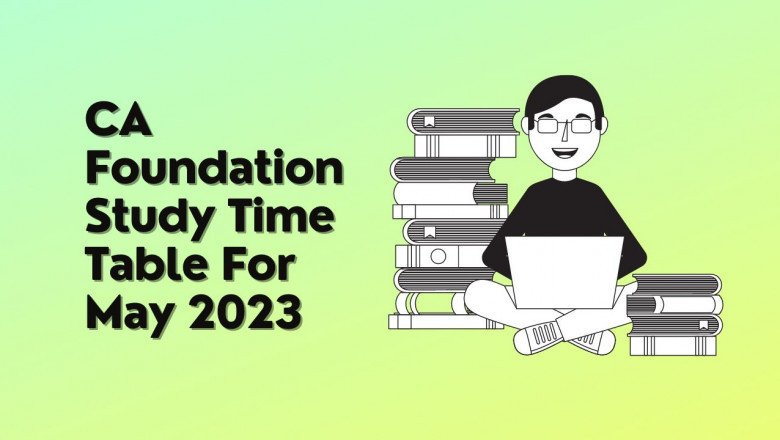
views
CA Foundation Study Time Table For May 2023
You should have a schedule for your CA Foundation studies that includes daily, weekly, and monthly study schedules. Ensure that the study schedule includes portions for the CA Exams Test Series. The CA Foundation test is a requirement for the Chartered Accountancy Course. The exam is the first requirement for becoming a chartered accountant. Currently, passing the Foundation exam is challenging due to the low passing marks and negative marks. Students need to establish a plan for their study time if they want to ace the Foundation exam in the first attempt and also they need to study from one of the best ca foundation books for the best results.

The student who is preparing for CA Foundation benefits from setting specific, well-defined learning objectives. As a result, you should plan your free time as a student in order to give your studies your complete attention.
When preparing for the CA Foundation Course, it is important to analyse and reorganise the syllabus, assign specific time slots to each subject, and plan study sessions in advance. Additionally, taking practice tests can give candidates an insight into how well they are prepared for their upcoming exam. Lastly, allocating sufficient time for revising is critical in order to understand major topics before moving on.
CA Foundation self-study strategy
One can better learn a subject by employing examples that are relevant to him or her personally rather than relying on the lecturer's detailed examples. Create your own self-study schedule and learn at your own pace. Courses are taught at teaching centres at the usual pace, notwithstanding the fact that pupils learn at different rates.
You are not obligated to follow anyone else's schedule or constraints when creating your own self-study timetable for CA Foundation. You can study that subject whenever you choose, without anyone's permission.
Create a customised Study Schedule
A customised study schedule for a CA Foundation student should take into consideration the following factors:
-
Study pace: Set a realistic pace of studying, taking into account your current workload, level of understanding and how much time you can realistically commit to studying.
-
Exam date: Plan your study schedule around the date of the CA Foundation exam, making sure you have enough time to cover all the subjects.
-
Weaknesses: Identify the subjects you struggle with the most and allocate more time for them in your study schedule.
-
Study resources: Make use of study material from various sources, including best ca entrance exam book, online resources, and past papers.
-
Breaks and revision: Include regular breaks and time for revision in your study schedule to avoid burnout and consolidate your learning.
Example study schedule:
-
Day 1-2: 4 hours per day for Economics and Business Studies
-
Day 3-4: 4 hours per day for Business Laws
-
Day 5: Revision of Economics and Business Studies
-
Day 6: Revision of Business Laws
-
Day 7: Take a break
-
Day 8-9: 4 hours per day for Accounting
-
Day 10-11: 4 hours per day for Mathematics and Statistics
-
Day 12: Revision of Accounting
-
Day 13: Revision of Mathematics and Statistics
-
Day 14: Take a break
While making a study timetable, the following things should be focused on:
-
Goals: Set specific, achievable study goals for each subject, with a focus on areas where you struggle the most.
-
Time management: Allocate sufficient time for each subject along with allocating time for breaks and revision.
-
Prioritisation: Prioritise subjects based on their weightage and level of difficulty, allocating more time to the subjects you struggle with the most.
-
Study methods: Consider different study methods, such as active learning (e.g. practice questions, summarising), and alternate between these methods to keep things interesting.
-
Realism: Make sure the study schedule is realistic and takes into account any other commitments you may have, such as work or family responsibilities.
-
Flexibility: Be flexible and adjust the study schedule as needed, based on your progress and level of understanding.
-
Breaks: Regularly schedule breaks and time for relaxation, to avoid burnout and ensure you are able to maintain focus over the long term.
Guidelines for 1 month study plan for CA Foundation:
Mathematics:
-
Identify the specific topic you need to study.
-
Review the basics and essential formulas for the topic.
-
Allocate time for studying, e.g. 2 hours a day, 5 days a week.
-
Create a study schedule, breaking down the topic into smaller, manageable sections.
-
Use different resources, such as textbooks, online tutorials, and practice problems to deepen your understanding.
-
Solve practice problems regularly to test your understanding and identify areas that need improvement.
Economics:
-
Start by reviewing the basic principles of economics.
-
Set a study schedule, allocating time each day or each week to economics.
-
Practice applying economic concepts by solving problem sets, participating in case studies, or working on projects.
-
Stay up to date with current economic events and analyse how they relate to the principles studied.
-
Make flashcards or summarise key concepts and theories in your own words to improve retention.
-
Consider finding a study group or a tutor to discuss economics with and to receive additional support.
Law:
-
Allocate specific time slots for studying each subject, taking breaks, and reviewing what you have learned.
-
Practise active learning techniques such as summarising, asking questions, and explaining the information to someone else.
-
Join a study group or connect with classmates to discuss and review material, ask questions, and receive feedback.
-
Apply what you have learned by doing practice questions, writing essays, or taking mock exams.
-
Keep track of important dates, deadlines, and notes in a planner or an app to stay on top of your studies.
Accounts:
-
Start with the basics: Ensure that you have a solid understanding of fundamental accounting concepts and principles.
-
Make a study schedule: Dedicate specific time slots for studying each topic, taking breaks, and reviewing what you have learned.
-
Use a variety of resources: Utilise textbooks, lecture notes, online tutorials, and practice problems to deepen your understanding.
-
Practice regularly: Complete practice problems, take mock exams, or work through real-life case studies to apply what you have learned.
-
Focus on areas of weakness: Identify the areas where you struggle the most and dedicate extra time to studying those topics.
-
Collaborate with others: Join a study group or connect with friends to discuss and review material, ask questions, and receive feedback.
-
Stay organised: Keep track of important dates, deadlines, and notes in a planner or an app to stay on top of your studies.
-
Take breaks: Regular breaks help to refresh your mind and prevent burnout. Take breaks to relax, exercise, or meditate.
-
Stay up-to-date: Stay informed of recent developments and changes in accounting to maintain a broad perspective and improve your problem-solving skills.
CA Foundation Study Plan for 3 months:
Here's a high-level 3-month study plan for CA Foundation:
Month 1:
-
Start with the basics of Accounting, Business Laws, and General Economics.
-
Make brief notes for each subject and revise regularly.
-
Take mock tests and analyse your strengths and weaknesses.
Month 2:
-
Focus on strengthening your weak areas and revise all subjects thoroughly.
-
Start practising problems and take more mock tests.
-
Give special attention to Accounting, it carries the maximum marks.
Month 3:
-
Revise all subjects one final time and focus on your weak areas.
-
Take as many mock tests as possible to build your confidence.
-
Get clarification on any doubts you have before the final exams.
Conclusion:
Creating a study timetable and following a regular schedule when preparing for the CA Foundation Exam in May is essential. Allocating time to each subject, getting familiar with question types, attending tuition classes, discussing difficult concepts with experienced accountants, studying from some of the best ca entrance exam books and taking practice tests online or through books can help improve chances of success in the exam. Utilising all these resources combined with hard work and dedication will ensure your success.












Comments
0 comment